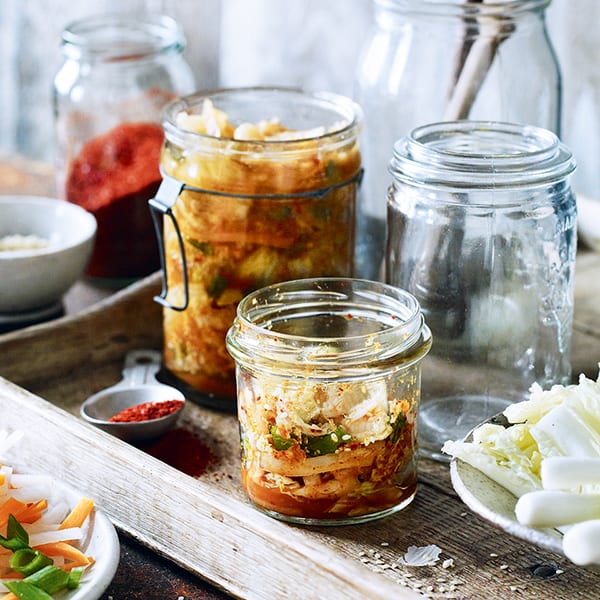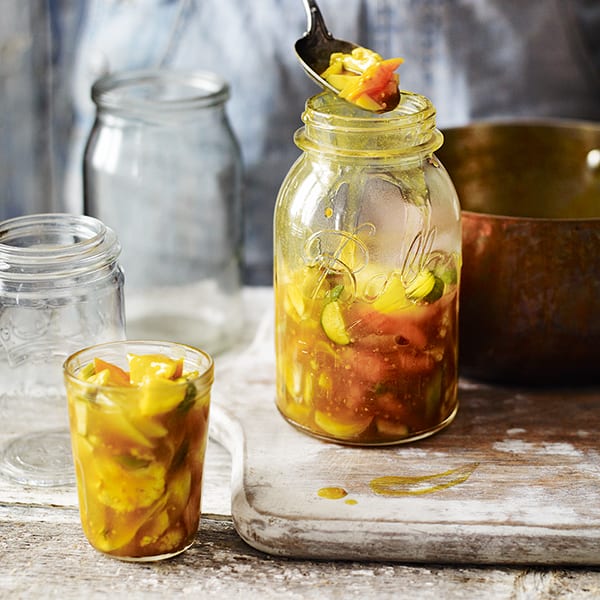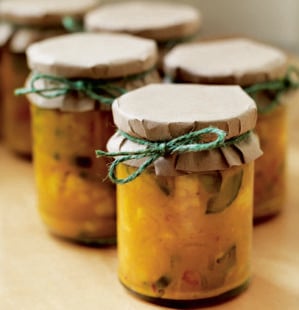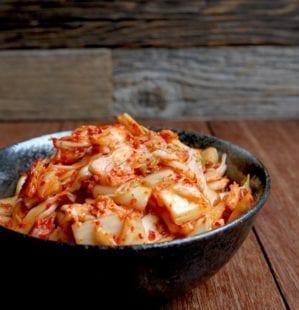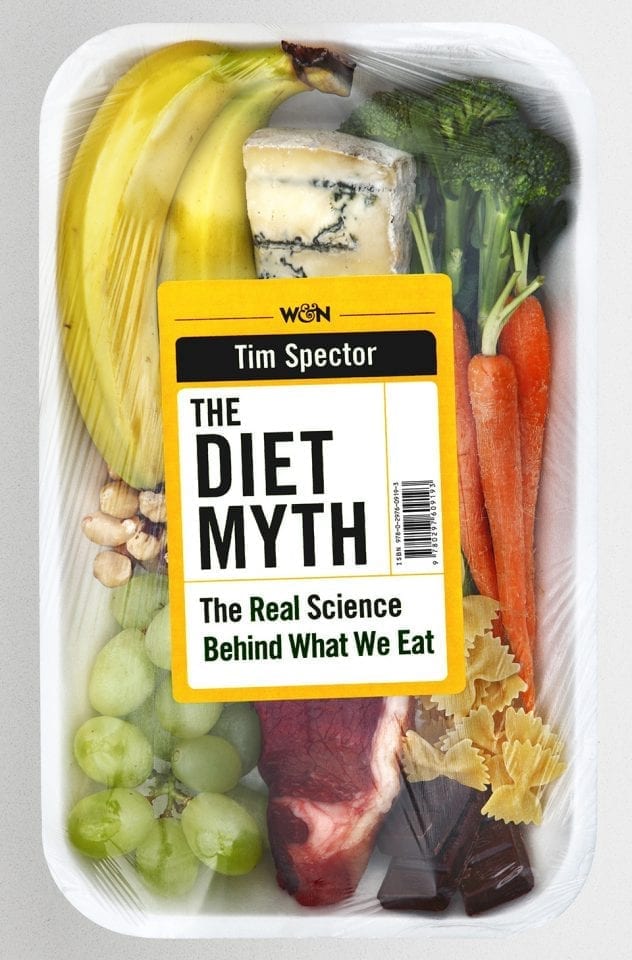A simple guide to pickling and fermenting
It’s a tradition that goes back centuries, yet it’s become the hallmark of trendsetters and hipsters from San Francisco to Shoreditch.
Some of the most beloved British foodstuffs, from chutney to piccalilli, rely on the transformative powers of pickling and fermenting, and if you haven’t yet fallen in love with kimchi, you may be about to meet a new flame…
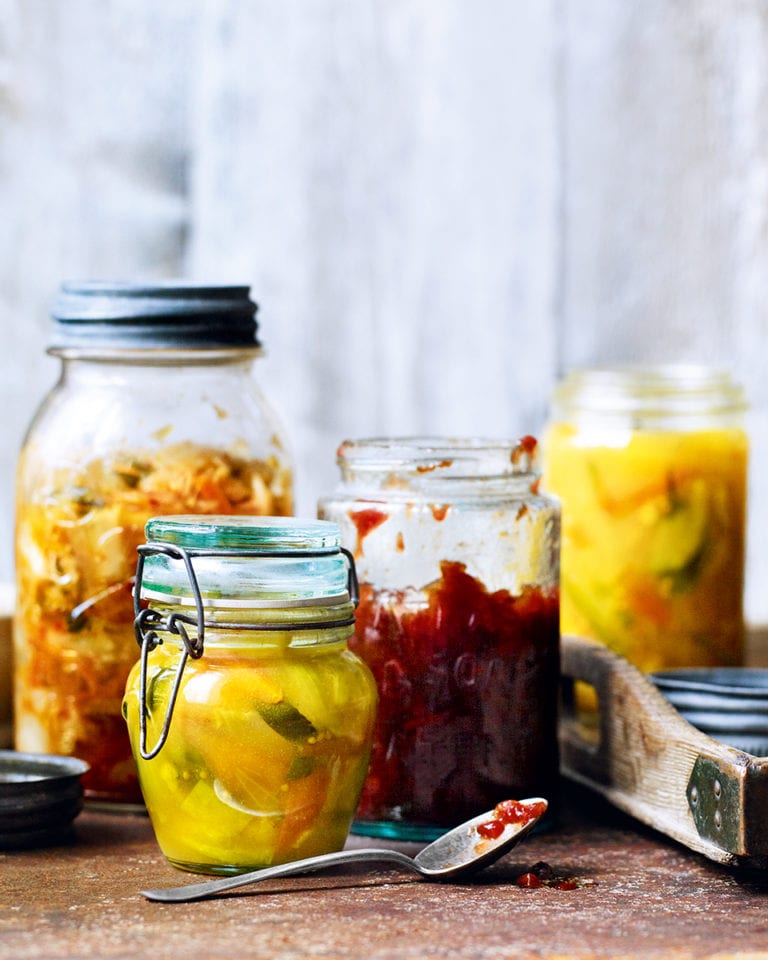
How to balance the flavours in pickling and fermenting
With pickling, sweetness, heat and spice can be added to create balance. For sweetness, add sugar to the pickling liquid or aromatic spices such as cinnamon, clove and cardamom. Add heat and heft with mustard seeds, chilli, cumin and coriander seeds.
As foods ferment, a sour tang develops with time, becoming more pronounced the longer your jarful is left to ferment. Add spices for heat and flavour. Keep the fermenting food cool to slow the process.
What’s the difference between fermentation and pickling?
Fermentation is a process in which the chemical makeup of a substance is changed by the activity of bacteria, yeast or mould (or a combination) – and this can happen in vinegar/brine.
Pickling, on the other hand, is a process in which ingredients are preserved by immersing in brine or vinegar (or both). Sugar is often added and heat is often applied – as in making chutney or piccalilli. Fermentation and pickling both greatly increase the lifespan of the food being preserved.
Why is fermented food healthy?
Fermented food and drink contains microorganisms beneficial to physical and mental health. Tim Spector, professor of genetic epidemiology and author of The Diet Myth (Weidenfeld & Nicolson), has conducted a vast amount of research into the benefits of fermented food and drink, concluding that these foods populate the gut with bacteria that are essential for good health.
The ‘western’ diet (low in veg, high in animal fat, sugar and additives) causes a depletion in gut bacteria, which can have a detrimental effect on your overall health.
Five best foods to ferment
• Leftover white/red wine or cider to make homemade vinegar
• Pitted cherries in rum to make a rumtopf for winter celebrations
• Fresh ginger root to make a fizzy probiotic ginger drink
• Black tea to make kombucha
• Carrots with sea salt and dill to make a crunchy, probiotic snack
What do I need for fermenting or pickling?
Simple glass clip-top jars are ideal, although ceramic jars work well too. A weight (such as a clean stone) is useful to keep vegetables submerged while fermenting.
For fermented drinks such as kefir and kombucha, a plastic sieve, some muslin cloth, string and glass bottles are useful. You’ll also need a scoby – buy at happykombucha.co.uk.
ESSENTIAL GLOSSARY
There’s a lot of confusing terminology around the topic of fermenting and pickling. Here’s a quick guide to what’s what…
What is culture?
Bacteria, yeast and other micro-organisms added to begin the fermentation process. Fermentation can also happen spontaneously, through airborne or naturally present yeasts and bacteria (the first wine and bread were made this way).
What is kefir?
A fermented drink rich in probiotics (beneficial bacteria). Kefir is usually made with milk but can be made with water to which sugar has been added.
What are kefir grains?
The starter culture used for making kefir. Water kefir grains are often larger and slightly translucent; milk kefir grains are smaller and creamy. They’re not interchangeable.
What is kombucha?
A fermented usually sweetened tea (can be black, green or white tea) that is gently effervescent.
What is scoby?
Acronym for ‘symbiotic colony of bacteria and yeast’ – the starter culture used for kombucha and other fermented drinks.
Subscribe to our magazine
Food stories, skills and tested recipes, straight to your door... Enjoy 5 issues for just £5 with our special introductory offer.
Subscribe
Unleash your inner chef
Looking for inspiration? Receive the latest recipes with our newsletter
